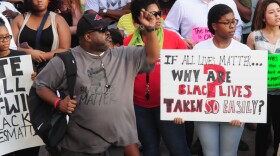It’s been almost a month since a gunman opened fire on police officers downtown Dallas. Since then, the department has been sorting through a deluge of job applications. Last week, Democratic presidential nominee Hillary Clinton gave a shout out to the city.
“Police Chief David Brown asked the community to support his force. Maybe even join him,” she said as she addressed the Democratic National Convention. “And you know how the community responded? Nearly 500 people applied in just 12 days.”
Those applicants will have to take a civil service exam and be interviewed and vetted. If they’re selected, they’ll enroll in Dallas police academy.
For those already enrolled, they enter a field as the department struggles with tragedy, and amid a contentious debate about policing.
The morning starts at 7:55 for the hundred recruits in the Dallas police academy. They form neat rows in the parking lot, raise the flag, and report in. Then, they drop to the ground, and do pushups.
The recruits are diverse. Like the city they will serve, it’s made up mostly of whites, Hispanics and African-Americans. Almost three quarters are men. All of them started their training before the shootings that rocked Dallas in early July.
“You know, we were scared. I mean, we’re normal human beings,” says 22-year-old Chelsea Montanino, whose class started just one week before the attack. “But I think for the most part, when that happened, it pushed us all together. We’re so new, it was a week in, but I feel like it really pushed us to come together as a family and as a team.”
In the days following the shooting, the recruits worked the funerals for the fallen officers. Police departments from across the country sent representatives, and the funerals were attended by thousands of cops. For new recruit Brannon Barber, who also joined a week before the shooting, seeing that unity strengthened his resolve to become one of them.
“It was a much needed moment for me to experience that, to realize what it is I’m getting myself into, and to also see and realize that I’m not out here alone but I have the support not only from my agency, but my brothers and sisters from around the nation,” Barber says.

Policing is in the middle of a fearsome debate these days. The Black Lives Matter movement has called into question police practices -- in particular their treatment of communities of color -- and challenged the image of police as keepers of the peace. Barber is African American, grew up in Oak Cliff, and says he’s never had a bad interaction with police. Still, he knows there’s work to do.
“You can’t place one man’s mistake over an entire agency, it doesn’t define what policing really is,” Barber says. “But it’s going to take us as a team, as a unit, as police officers, to rebuild relationships with the community to where they’re fighting with us instead of against us.”
The academy lasts nine months. Recruits learn the basics: things like filing reports and what goes where on their belts. All recruits learn basic and intermediate Spanish.
Dallas has earned praise for more progressive policing. The training emphasizes community engagement and teaches recruits to see themselves as guardians more than warriors. Dallas police officers are trained in de-escalation tactics to reduce the use of force.
“I heard so much and so many good things about the training,” says Chelsea Montanino, who moved to Dallas from North Carolina. “And it’s not very often you see Dallas in the news for anything bad. So you really think about those kinds of things, and the training you’re going to receive. And it really shows in the officers that they have.”
The department wants people who want to serve their community, says Deputy Chief Jeff Cotner, who oversees training for the Dallas police. That’s because policing is not what you see on TV, he says.
“It’s not cops and robbers always engaged in some sort of dynamic activity,” Cotner says. “Most of what they do, day in day out, is be guardians. They’re going out on some sort of call to solve a problem for someone. We’re problem solvers. You, through the basic training program, you’re teaching officers how to individually solve people’s problems.”
Like other departments across the country, Dallas has struggled to attract new recruits. The city’s also struggled to retain officers, in part because of low pay.
Despite last month’s shooting, and the heated debate that surrounds policing, Cotner says these recruits are entering the field at an exciting time.
“It’s a good time to be in law enforcement,” Cotner says. “It’s a good time to make positive change. It’s a good time for law enforcement to reflect upon what it is that they need to do, adhere to some best practices and reflect on everything that we do, and make it better.”
Cotner’s confident when these new recruits go out on patrol, they’ll be ready to be that better police force.






